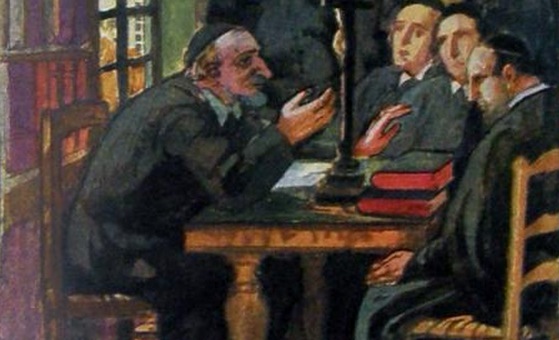 Vincent and Stephen R. Covey: From Time Management to Self Management presented by the Vincentian Leadership Project at DePaul University.
Vincent and Stephen R. Covey: From Time Management to Self Management presented by the Vincentian Leadership Project at DePaul University.
After a fine summary of the work of Stephen Covey the article continues…
Covey once offered in a lecture three questions for the servant-leader who hopes to mentor and empower others:
- “What are your goals?”
- “How can I help?”
- “How is it going?”
Vincent’s Steps to Effective Leadership
One can easily think of Vincent de Paul in the context of these three steps to effectiveness and sustainability. Vincent’s enterprises on behalf of the poor all were successful due to his ability to build trust, respond creatively, and organize a consistent and sustainable response to the needs he witnessed around him.
The earliest example of Vincent’s leadership effectiveness is the story of his experience at Chátillon-les-Dombes in France. In 1617, Vincent was serving in the village as a parish priest. One Sunday, while vesting for Mass, a parishioner told Vincent about a family suffering from severe health problems and in desperate need of care. Vincent decided to preach at the Mass about the family’s need.
Fuechtmann tells us that the family lived some distance into the countryside, but later that day as Vincent made his own way on foot toward the family’s house, “he discovered a veritable procession of people from the parish also on the way to provide assistance.” Vincent quickly took stock of the situation: “There is great charity,” he said, “but it is badly organized.” Vincent responded with creativity and organization. Within days, he identified nine women willing to take turns to provide assistance, and provided them with a written plan for how to do it. Before the end of the year, the first Confraternity of Charity (now known as the Ladies of Charity) was officially established.
Fuechtmann’s reflection on the lessons from this story illustrates how Vincent responded using Covey’s three steps to leadership effectiveness. “[Vincent’s] preaching inspired a remarkableresponse of care-giving on the part of the village. Vincent assessed the spontaneous outpouring of the generosity and organized it for effective and lasting results.”
Vincent Encouraged Principle-Centered Leadership
For Vincentians, Covey’s list of characteristics of a principle-centered leader echoes the words of John Freund, C.M., in describing the personal attributes promoted by Vincent:
Because it took character to perform Jesus’ mission, character formation was required of the apostle. Building habits of hard work, truthfulness, evenness in mood, doing with less, listening, empathy, steadiness, detachment, readiness to move on, perseverance, humility and the like was essential for following the missionary Jesus. For Vincent, Christian discipleship did not exist in the abstract. It came to life in practical service. (http://www.vincenter.org/vdp-ldm/biov.html)
Vincent as Mentor
Writing about Vincent de Paul as a mentor, Alison Forrestal, offers us this portrait of his approach:
“The Christ of charity was therefore the mentor of Vincent de Paul, who sought to form himself in the mould of compassion, zeal, self-giving and service. This meant that he understood mentoring to function in two ways, beyond the practical organisations of the offices in his charitable infrastructure: firstly, the mentor should act as a living example and inspiration to others; and secondly, they should be devoted to helping others to live up to the ideals set by their supreme mentor Christ”(2007, 10).
Given just the few examples provided here, it seems there is no doubt that Vincentians around the world certainly can take pride in Vincent de Paul as someone who provides a role model for Covey’s contemporary portrait of an effective, principle-centered leader.
Reflection Questions
What actions do you take to build trust among those you lead?
What is one creative way you addressed a situation you encountered in the past month?
What learning goals do you have for yourself in the coming year?
How are you helping others to learn and grow as you lead them?
Resources
Covey, Stephen R. 1989. The 7 Habits of Highly Effective People: Powerful Lessons in Personal Change New York, NY: Simon & Schuster. Used with permission.
_______________. 1991. Principle Centered Leadership. New York, NY: Simon & Schuster. Used with permission.
_______________. 2004. The 8th Habit: From Effectiveness to Greatness. New York, NY: Simon & Schuster. Used with permission.
Forrestal, Alison. “Vincent de Paul as Mentor,” Vincentian Heritage, Vol. 27, No. 2, Chicago, IL: Vincentian Studies Institute. 2007. Used with permission.
Fuechtmann, Thomas G. 2005. “ ‘There Is Great Charity, But’…Vincent de Paul and the Organization of Charity,” in Vincentian Heritage, Vol. 23-25, No. 2, Vol. 26. No. 1. Chicago, IL: Vincentian Studies Institute. 2005. Used with permission.
Be sure to visit Hay Vincentian Leadership







0 Comments